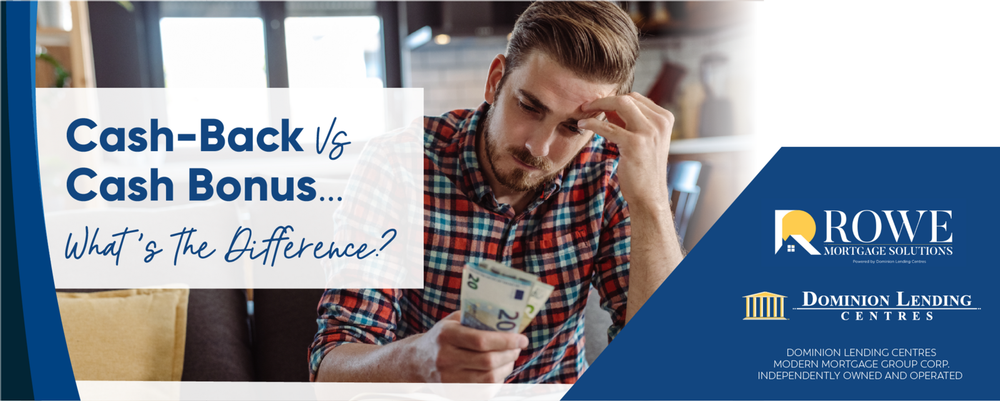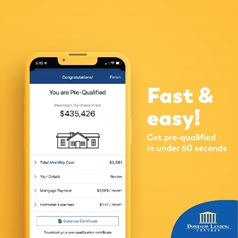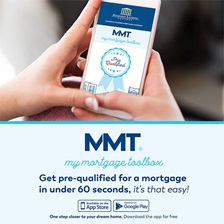Cash-Back Vs Cash Bonus…What’s the Difference?

To compete for business, banks will often incentivize homeowners by offering either cash-back or cash bonuses to earn their mortgage business.
This isn’t just a way of earning business, but by dangling a carrot and getting you focused on the cash it steers the conversation away from the fine print and important features of the mortgage that could easily cost you more money in the long run.
It should be no surprise to discover there is always fine print when it comes to these cash promotions whether it be cash-back or a cash bonus.
But what is the difference between these two types of incentives? Most people didn’t realize there was a difference and often lump them together.
That’s why we thought it imperative we discuss these differences in this month’s blog post.
So let’s dive in!
What is cash-back and the fine print that goes with it?
Cash-back is money provided to a mortgage client based on a percentage of the mortgage amount. It is not included or added to the mortgage but cash offered to assist with closing costs or refund you for expenses paid out-of-pocket.
The amount cash-back you can receive from the bank can vary from bank to bank and be between 1 – 7%.
For example, if you are obtaining a $300,000 mortgage you may be offered 1% cash-back, which in this example would equate to $3,000. Some banks can offer as high as 5% depending on the situation, which in this example would provide the homeowner a whopping $15,000 just for bringing their mortgage to that bank. 7% is even possible with some banks!
Seem too good to be true? Here’s the catch:
Your interest rate will increase. Generally, depending on the bank and their guidelines around cash-back they will increase your base contract rate by between 0.15 – 0.25% for every 1% of cash-back added to your mortgage.
You might have to pay this money back. Many lenders including major big 6 banks like CIBC put it in the fine print that you must pay ALL of this money back if you break your mortgage term early for any reason. So on top of paying a penalty to break your mortgage, you will also be on the hook for the cash-back.
Some banks offer a more favorable tier-back approach where you will only owe a percentage of the cash-back depending on when you are breaking the mortgage (i.e. you’ll owe more in year 2, compared to year 3 or 4 of your mortgage term) which if you are thinking about taking some cash-back is a good option to consider to help mitigate that risk.
What is a cash bonus and the fine print that goes with it?
When a bank offers a cash bonus, it is based on a fixed amount of money that the bank is willing to offer out-of-pocket for a specific mortgage size or type (first-time buyer mortgage, default insured mortgages etc.). It is often offered as part of an advertising campaign during peak real estate seasons but can also be used during slower parts of year sometimes.
Compared to cash-back, the range of money you can receive doesn’t vary widely and can be quite smaller, however the fine print can be a lot more digestible and less daunting to accept.
So what is the fine print?
You will need to open up a bank account with that lender. Essentially, the goal for any major bank is to not just obtain your mortgage business but also your investments and daily chequing accounts. One way they do this is by tying the cash bonus to the condition of you setting up your mortgage payments through one of their accounts. If you wish to use a different financial institution for your payments, then no cash bonus for you.
You will need to take a minimum 3 year term. If you were planning on taking a 1 or 2 year term, most banks will require you take a minimum 3 year term in order to receive the cash bonus.
Needs to be a new mortgage, not an existing mortgage. This one might be obvious, but if you already have your mortgage with that bank you’re not going to get any special treatment most likely. The cash bonus is a bank’s way of buying the business, and they don’t have any interest in paying for business they already have.
Minimum Mortgage Size. Most banks offering a cash bonus will have a disclaimer that the mortgage needs to be at least $100,000 or more to receive any form of cash. The bigger the mortgage, the bigger the bonus.
So there you go, a simple but essential breakdown of the difference between cash-back and cash bonus.
Are you shopping for a new mortgage and interested in hearing about the current cash promotions out there?
Schedule a call with us today to learn more about your options and how we can help.
Article Written by: Cody Rowe
Mortgage Consultant & Credit Specialist



